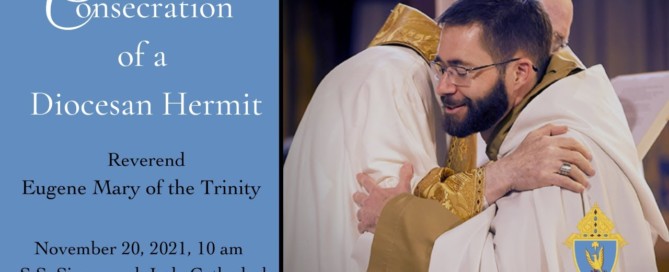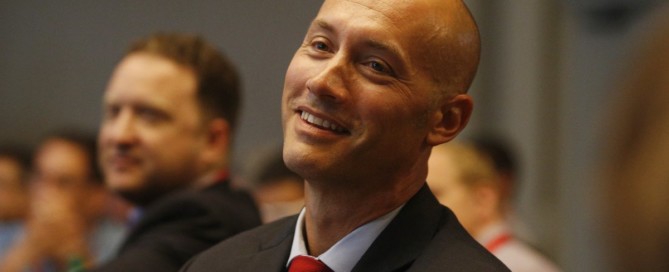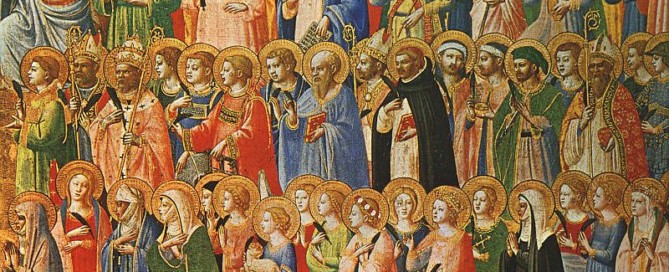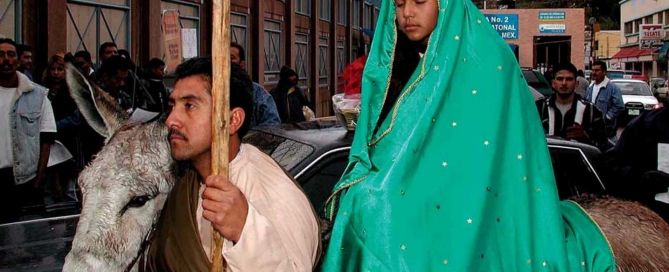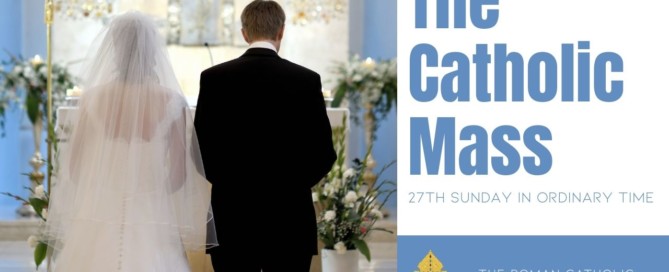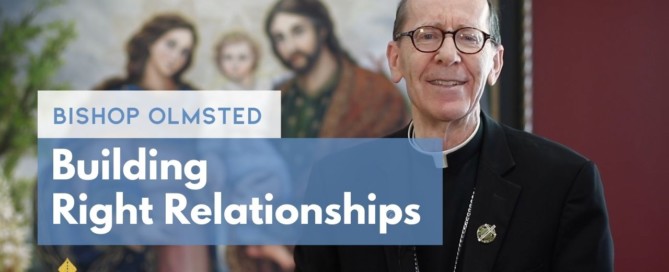Welcome to Our New Website!
“Seek what is above.”
“Seek what is above.”
Following is the prepared text from Bishop Olmsted’s homily for the Consecration of a Diocesan Hermit.
November 20, 2021
“My soul is thirsting for you, O Lord my God.” – Psalm 63
These words of Psalm 63 capture a great longing for intimacy with God, with which many can identify, especially a diocesan hermit. For a man called by Christ to be a hermit in the desert of Arizona, the imagery of the psalm has particular vibrancy, as it describes well the urgency of his soul: “O God, you are my God, whom I seek; for you my flesh pines and my soul thirsts like the earth, parched, lifeless and without water.”
For whomever are reborn in Christ through Baptism and not mired down in sin, these words capture their keen desire for intimacy with God. After months and months of social distancing, our longing for the nearness of God is greater than before. We can readily make our own verse nine of Psalm 63, “My souls clings to you, O God; your right hand holds me fast.”
Father Eugene, my spiritual son in Christ, in addition to your contemplative prayer with and for the Church, your primary apostolate is to help priests deepen their interior lives through spiritual direction and retreats. This apostolate is greatly needed at the present time in history, when we priests and bishops can become distracted by the noise of the world and the temptations of the evil one, and forget Jesus’ words to the Apostles at the Last Supper, “Remain in me, as I remain in you… because without me you can do nothing” (Jn 15:3ff). The lay faithful, too, are reminded by your life of silence and solitude at the Merciful Heart Hermitage to keep their eyes fixed on Jesus, who inspires and perfects our faith (Cf. Heb 12:2).
When we drive through Black Canyon City coming south, if we lift our gaze to the hilltop on the left and notice a small white chapel, which indicates the site of your hermitage, I pray we shall always be reminded of St. Paul’s exhortation to the Colossians in which he says, “If then you were raised with Christ, seek what is above…” (Col 3:1f). Then, he adds, “Think of what is above, not of what is on earth.” Seek what is above; think of what is above.
A diocesan hermit, and others who accept God’s call to Consecrated Life in the Church, help the rest of us to rise above the mediocrity of our times, to keep our minds on the Gospel, and to fix our eyes on Jesus. They remind us that, in the waters of Baptism, the Father raises all of us with Christ, lifting our attention beyond this world to the Kingdom that lasts forever. Whoever make a permanent profession of the evangelical counsels of chastity, poverty, and obedience are renewing and deepening their commitment to the promises they made in Baptism and inspiring the rest of us to do the same.
A few moments ago, I asked you, Father Eugene, “What do you ask of God and the Church?” You answered, I want to live a “life of prayer and penance, for the glory of God and the service of the Church.” In other words, you want to imitate Christ, who became poor to make us rich, a slave to set us free, an obedient son who told His heavenly Father, “Not my will but yours be done.”
When St. Paul told the Colossians, “Think of what is above, not of what is on earth,” he was not speaking so much about a physical location but about a decisive orientation of one’s life, a desire to lift up our hearts to God and to put the interests of others ahead of our own (Col 3:3). Already now on earth, we share in the life of Christ, especially when we are nourished with His body in the Eucharist and enlightened by His holy word.
How appropriate it is that Jesus tells us today: “I am the vine, you are the branches. Remain in me” (John 15:5). If a vine does not produce grapes, it is worthless. And that is what we human beings become if we do not remain one in Christ. Jesus indicates two things that are needed to remain in Him: pruning and obeying. About pruning, Jesus says, “I am the true vine, and my Father is the vine grower. He takes away every branch in me that does not bear fruit, and every one that does He prunes so that it bears more fruit.” Notice that the vine grower conducts two different actions: He “takes away” the barren branches and he “prunes” the fruitful branches so that they may bear even more. Both actions are vital for a vine to bear fruit.
Sometimes in drastic ways, at other times in small, the Father prunes and removes things that could hinder our fruitful witness to His Son. He does this in various dimensions of our lives: Physically, we age, we suffer from illness, or our friends move away. Emotionally, we experience uncertainty or disappointment. God, who at one time seemed so near, may now seem far away. Initial fervor begins to wane. Our hearts get restless, and our souls can doubt. In all these things, God the Father is at work, pruning and trimming, so that we can bear more fruit. And what does He ask of us? Trust, surrender, and confidence in His plan even when we do not understand. He is the Vinedresser. We are the vine. Accordingly, in the solemn Profession prayer, as the Bishop of Phoenix, I have the honor of asking the following for Father Eugene Mary of the Trinity:
“Send him the Spirit of holiness, help him to fulfill in faith what you have enabled him to promise in joy… Give him perfect chastity, ungrudging poverty and wholehearted obedience.”
Phoenix diocesan communications director is new CMA executive director
Phoenix diocesan communications director is new CMA executive director
CHICAGO (CNS) — Rob DeFrancesco, communications director for the Diocese of Phoenix, said he was “eager to work” with the staff of the Catholic Media Association as the Chicago-based organization’s new executive director.
“I attribute many of the blessings in my life to my involvement” with the CMA, he said Nov. 4, adding he is grateful “for this opportunity.”
Two days earlier, Amy Kawula, CMA’s president, announced DeFrancesco had been named to head the organization, effective Nov. 15. DeFrancesco succeeds Tim Walter, who is retiring after 13 years in the post.
Kawula said she was “beyond delighted to announce” that “a familiar face in the CMA” was chosen for the position after a six-month nationwide search.
DeFrancesco “has been a member for more than 20 years and served as president of the board” and “brings two decades of leadership and media experience” to his new job, added Kawula, who is the advertising and marketing manager of The Compass, newspaper of the Diocese of Green Bay, Wisconsin.
“Rob’s ability to quickly develop and maintain strong relationships with members, sponsors and other key leaders will be critical to the transition of this position,” she said, adding that “to ensure a smooth transition,” Walter will work with DeFrancesco on a part-time basis through Dec. 31.
All Saints Day
All Saints Day
Following is the prepared text from Bishop Olmsted’s homily for the Solemnity of All Saints.
November 1, 2021
“The only one real sadness, the only real failure, the only great tragedy in life is not to be a saint.”
These words of the French novelist Léon Bloy help us understand why All Saints Day is so important. God created each of us to be a saint. He made us to be fully alive in Christ and to be happy with Him forever in heaven. No one desires our happiness as much as Jesus does—now and in eternity. So, at all times and in every place, God draws near to each human person, seeking us out, calling us by name (CCC 1).
To respond to Jesus’ call to be saints, we need to see, not with the eyes of our body but of our soul. St. John writes: “Beloved, see what love the Father has bestowed on us that we may be …children of God. Yet so we are” (1 John 3:1). This is who you and I are: God’s beloved son or daughter. As St. John wrote, “To all who received Him, who believed in His Name, He gave power to become children of God” (John 1:12-13).
To understand the honor of being a saint, what must we do? Jesus answered that question at the Last Supper when He told the disciples, “Remain in me, as I remain in you. Just as a branch cannot bear fruit on its own unless it remains on the vine, so neither can you unless you remain in me” (Jn 15:4). Jesus speaks of five things needed to remain in Christ.
First, avoid sin. Happiness and sin are incompatible. They are at odds with each other. Sin makes us miserable. It turns us inward on the mess we have created in an unclean heart. To remain in Jesus, to be happy, we must not sin.
The second way to remain happy is to obey the commandments. Jesus said it simply and straight-forward, “If you love me, keep my commandments” (Jn 14:15). Obedience protects our happiness because it keeps us one with God and His plan created for our happiness. St. John writes: “The way we may be sure that we know Him is to keep His commandments. Whoever says, ‘I know Him,’ but does not keep His commandments is a liar, and the truth is not in him” (1 Jn 2:3f).
The third thing needed to be happy and holy is to live as Jesus did. St. John said, “This is the way we may know that we are in union with Him: whoever claims to abide in Him ought to live just as He lived” (1 Jn 2:5f). We need to walk the walk of faith, following in the footsteps of Jesus.
Fourth, to remain in Christ, we must desire to see His face, to be continually in His Presence. Psalm 24 makes this point perfectly: “Lord, this is the people that longs to see your face.” The Psalm goes on to say: “Who can ascend the mountain of the Lord? Or who may stand in His holy place? One whose hands are sinless, whose heart is clean, who desires not what is vain… Such is the race that seeks Him, that seeks the face of the God of Jacob.”
The fifth thing needed to remain in Christ is to be willing to suffer for love of Him. It seems contradictory, but it’s true. Only those willing to suffer for the sake of love understand this mystery. Jesus speaks of it twice during the 8 Beatitudes: twice because the way to close friendship with Jesus is the way of the Cross, the way of suffering for love of the Lord. So, let’s look at the two Beatitudes that teach us that the only road to happiness is not to avoid suffering but to embrace it in union with Jesus.
Jesus tells us in the second Beatitude: “Blessed are they who mourn, for they will be comforted.” (Mt 5:4) There is a kind of mourning that fills our heart with peace as it unites us with the suffering of the innocent. St. Veronica experienced this when she wiped the face of Jesus along the way to Calvary. It is experienced by those who stand in solidarity with the unborn children and their moms who are victims of the violence of abortion, or when we cannot change the circumstances of horrific evil but can at least resist the evil internally by mourning in silent protest and watchful prayer.
The other beatitude that speaks of grief that leads to happiness is the eighth: “Blessed are they who are persecuted for the sake of righteousness, for theirs is the Kingdom of heaven” (Mt 5:10). Jesus refers to two kinds of persecution that His faithful disciples may suffer: the persecution of martyrdom–suffering death for the love of Jesus, and the persecution of being scorned and shamed for faithfully defending the truth, refusing to be intimidated by the taunts of those who think that might makes right. Might does not make right; might makes misery. Linked closely with these Beatitudes are Jesus’ words: “Blessed are you when they insult you and persecute you and utter every kind of evil against you falsely because of me. Rejoice and be glad, for your reward will be great in heaven” (Mt 5:11f).
Holiness–to be a saint–is possible everywhere, and it begins in our home, our school, our parish, and our neighborhood. You and I can have a close friendship with Jesus. We can remain in His love. We can live the Beatitudes wherever God plants us. In fact, that is why the Lord made us: to know, love, and serve Him in this world and to be happy with Him forever in heaven.
“Beloved, see what love the Father has bestowed on us that we may be …children of God. Yet so we are.”
The Crisis Before Us
The Crisis Before Us
Following is the prepared text from Bishop Olmsted’s homily for the Prayer Vigil for Migrant Justice.
October 11, 2021
I am grateful for the opportunity to spend this evening united with you in prayer. I am also thankful for the Catholic Coalition for Migrant Justice who organized this prayer vigil and especially for the charitable works you have undertaken to reach out with love and solicitude to migrants in our state and nation.
In many Latin American countries and across the US, there is a beautiful Catholic tradition called “Las Posadas” that was introduced by the Franciscan missionaries in the 16th century to help new Christians to prepare to welcome Jesus Christ into their lives at Christmas and beyond. Each night from December 16th to the 23rd, people depicting the Blessed Virgin Mary and St. Joseph, or statues representing them, are taken in procession from house to house begging for a place to stay. A ritual of singing takes place between those asking for shelter and those who are inside. The hymn begins with St. Joseph knocking and asking, “In the name of Heaven please give us some shelter.” The immediate reply to St. Joseph gives reasons why they will not open their home, telling the weary couple, “You need to move along!” St. Joseph, then counters their rejection: “We are very tired. I came from Nazareth, Joseph is my name, carpenter by trade”. A voice from within answers back, “I don’t care for the name: let me go to sleep, because as I told you, I won’t open to you”. However, after St. Joseph identifies his wife as “the Queen of Heaven” and “Mother of God’s Holy Word”, the owner of the house then has a change of heart and confesses “I was not aware!” and he bids them to enter. From then on, the real “fiesta” begins.
The hymn and the whole “posadas” tradition help those who participate to experience what it must have been like for the pregnant Mary and Saint Joseph to repeatedly hear that there was no place for them. It makes us wonder under what conditions would most of us be moved to open our doors and lives to strangers. Notice that the change of attitude of the owner occurs when he recognizes that among those who were asking to be admitted was – despite all appearances – “Someone special and worthy of respect”.
“Las Posadas” is not only a powerful allegory for the current crisis of immigration in our nation but also a palpable reminder of the Christ-centered truth behind the social teaching of the Church, especially the Catholic Principles of Migration, above all this: Every human person has inherent dignity and is created in the image and likeness of God and therefore possesses infinite value and worth. As a result, in every suffering person we are challenged to see “someone special and worthy of respect” – to see the face of Jesus.
We have all heard of the record numbers of immigrants at the Southern U. S. border – tens of thousands have been detained while crossing and the bodies of hundreds more have been recovered from the desert; we have all seen the images on the news. These facts cry out for a response. However, the current system is broken. Our immigration laws are chaotic, and, when they are selectively enforced, they create a dangerous situation for immigrants as well as Americans.
There is no denying that we have an immigration crisis. But the real issues are more than just border security and undocumented immigrants. For this reason, for our time together this evening, it is my hope – it is my prayer – that we can turn our minds and hearts to consider the crisis before us in a different light. In this moment of prayer and reflection, I invite you to enter a deep, intimate, and personal encounter with Jesus, where we might focus not only on the human crisis before us, but also on the crisis of faith within and around us.
The crisis before us is not just about migrants. It’s about us. On the World Day of Migrants and Refugees of 2019, Pope Francis gave such a fitting title to his message: “It is not just about migrants”. In it he states:
“it is not only the cause of migrants that is at stake; it is not just about them, but about us, and about the present and future of the human family. Through [the migrant] the Lord invites us to embrace fully our Christian life and to contribute, each according to his or her proper vocation, to the building up of a world that is more and more in accord with God’s plan”.
The immigration crisis has its roots in the crisis of faith, the crisis of failing to recognize our Lord Jesus in the suffering and needy. You won’t see this crisis of faith acknowledged on the evening news nor splashed across the internet. It is a crisis that concerns what America was, is, and will become. Our nation is changing on the inside. We have a legal structure that allows and even pays for the killing of babies in the womb. Our courts and legislatures are redefining the natural institutions of marriage and the family. We have a culture in which segments of government, media, and academia are openly hostile to religious faith. Because of this vast array of opinions on the dignity of every human person and the value of marriage and family, there is an enormous division over what to do with illegal immigration. The crisis before us is not just about migrants.
Born of all this, then, is a crisis within, characterized by division, fear, and suspicion that dominate our discourse on immigration. There has been a lamentable rise in anger towards migrants that is unbecoming of a nation of immigrants with such a clear and defined Christian heritage. If we are honest with ourselves, we can recognize that prejudice is a driving factor behind much of our political discourse. The most troubling aspect behind the debate on immigration is that we, as Catholics, no longer see the strangers among us as our brothers and sisters in Christ, but only as thieves or criminals or a means to an end. This is our “crisis within.”
Like “Las Posadas” tradition, many immigrants asking for shelter in our country often find closed doors and closed hearts. The most common responses to undocumented immigrants are dehumanizing – labeling them “criminal aliens” and ignoring the real and essential human needs, including poverty and lack of work, that led them to journey far from home, often at great risks. Without a doubt, like in “Las Posadas,” the response from many Christians would change if the weary and desperate face before us was Jesus Christ Himself. For this reason, at the heart of the immigration crisis – for us Christians – is our failure to recognize the face of Christ in those who are suffering and in need. Jesus told us that we would be judged by how we respond to Him in others when He said: “I was a stranger and you welcomed Me” (Mt 25:35). This is Jesus’ clear teaching: the way we treat the least of our brothers and sisters is the way we treat Him. Thus, the Catholic response always begins with Jesus Christ and our recognition that the immigrant is, in fact, “someone special who is worthy of respect”.
It is our vocation to contribute to the whole conversation on immigration with the light of the Gospel and the Church’s teaching, taking it out of the arena of politics and seeing it through the lens of our Faith – focused on the face of Christ – often in almost unrecognizable forms. In this sense, it is the face of the Suffering Christ that we encounter in the migrants who are seeking safety, shelter, food and work.
Pope Benedict XVI, in his message for the World Day of Migrants and Refugees in 2013, reiterated that our social contribution to this issue can never neglect the religious dimension when he said: “It is to this dimension that the Church, by virtue of the mission entrusted to her by Christ, must devote special attention and care: this is her most important and specific task”. The Church does this in Christ, in solidarity with the least among us, with the goals of helping our neighbors as well as evangelizing our own culture. The goal of the Church is always communion in a society marked by division; sadly, the political divisions are also being felt in the Church.
Nevertheless, the vocation of the Church requires her to be a sign and servant of unity. Therefore, the Church must avoid involvement in party politics, since this would divide the community. More importantly, all Catholics must keep carefully in mind that no political party in our nation fully expresses Catholic Social and Moral teaching. It is the work of every member of the Body of Christ to take care that the demands of political parties and the unique points of view of the media do not guide our discussion on any issue, much less the important issue of immigration today. The Church has something to say to every party, and no member of the faithful should find himself or herself directed by the political views of society without first being informed and empowered by the Gospel mandate to care for our brothers and sisters and especially, for the least among us.
For the Church to work as leaven in society, healing from within must come through the difficult work of dialogue. This involves patient listening to those with whom we disagree. We are called to accept those we disagree with as persons, while striving to lead them to value human dignity, solidarity, and a conscience formed by Scripture and Tradition. Many speak of the common good, but that necessarily includes the moral and spiritual good, not simply a material one. As Christians, we need to take the lead in the work of comprehensive immigration reform that embraces both justice and the right application of the law – especially Christian hospitality, love and mercy.
To conclude, I wish to echo our Holy Father’s words for Migrant Day 2014:
“Every human being is a child of God! He or she bears the image of Christ! We ourselves need to see, and then to enable others to see, that migrants and refugees do not only represent a problem to be solved, but are brothers and sisters to be welcomed, respected and loved. They are an occasion that Providence gives us to help build a more just society, a more perfect democracy, a more united country, a more fraternal world and a more open and evangelical Christian community.”
We are all involved in a daily real-life posada, on one side of the door or the other. Will we decide to reject or to embrace “the Joseph, Mary and Baby Jesus” that come to us?
Let me close with these Words of Christ from the Book of Revelation: “Here I am! I stand at the door and knock. If anyone hears my voice and opens the door, I will come in and eat with him, and he with me” (Rev 3:20).
Marriage – God’s Remarkable Plan
Marriage – God’s Remarkable Plan
Following is the prepared text from Bishop Olmsted’s homily for the 27th Sunday in Ordinary Time.
October 3, 2021
“Is it lawful for a husband to divorce his wife?”
A good question if asked for the right motive, if really seeking the truth. But the Pharisees asked this question to trap Jesus. They knew divorce was widely accepted at that time but also knew the teaching of the Prophet Malachi that God hates divorce (Cf. Mal 2:16). The Pharisees had no interest in understanding or defending God’s plan for marriage; they just wanted to ensnare Jesus and disgrace Him in the eyes of the people. So, they told Him: Moses permitted a husband to divorce his wife and marry another. Jesus replied, Moses only did that because of their “hardness of heart,” their stubborn refusal to accept God’s plan.
“But from the beginning of creation, God made them male and female. For this reason, a man shall leave his father and mother and be joined to his wife, and the two shall become one flesh… Therefore, what God has joined together, no human being must separate.”
Jesus defended marriage as “a great mystery” that is a sign of His love for the Church (Cf. Eph 5:32). The Pharisees were not pleased by Jesus’ answer, and even the Apostles were perplexed. So, as soon as Jesus withdrew from the crowd, they questioned Him further and He replied,
“Whoever divorces His wife and marries another commits adultery against her; and if she divorces her husband and marries another, she commits adultery” (Mt 10:10).
Jesus’ words did not end the controversy, but nonetheless they are the truth. Furthermore, they are not just true news, they are good news! Down through history, faithful followers have embraced them, and been blessed. And they have defended them: John the Baptist was martyred for telling Herod it was wrong for him to marry his brother’s wife. 1500 years later, St. Thomas More and St. John Fisher were martyred by King Henry VIII for refusing to approve his divorce. In our own time, an epidemic of divorce has weakened the social fabric so much that many people have given up on marriage, countless children suffer from the primal loss of a united home, and numerous young people are burdened with gender confusion, doubting that God made us male or female.
How important, then, for God’s word today to lift up the beauty and nobility of family life, with confidence that marriage is far more than just a human construct; it is God’s plan, and He gives he grace needed to live it.
Still, I am aware of the cost of fidelity and the pain many experience despite their best efforts to remain faithful. Many doubt that a united family life is within reach. We are all aware that the entrance of sin into our world has damaged and continues to threaten the stability of the family and all relationships. Every family struggles under the burden of sin and the constant attacks by Satan, the father of lies. Nonetheless, the suffering caused by sin, when surrendered to Jesus and united with His Cross becomes redemptive and can be the source of grace and sanctification.
It is certainly providential, therefore, that our Second Reading today from the Letter to the Hebrews, exhorts us,
“…since we are surrounded by so great a cloud of witnesses, let us rid ourselves of every burden and sin that clings to us and persevere in running the race that lies before us, while keeping our eyes fixed on Jesus…” (Heb 12:1f).
We are not alone in our struggles, “a great cloud of witnesses” surrounds and intercedes for us: and Jesus is our divine intercessor at the Father’s right hand.
We find inspiration, too, from holy married couples like Louis and Zélie Martin, the parents of St. Thérèse, who faced great hardship and piercing grief with the deaths of two infant sons and also two daughters, one in infancy and another at the age of five. Zélie herself died of cancer when Thérèse was only four years of age. This married couple, canonized only a few years ago, achieved great holiness by uniting their pain and sorrows with Jesus on the Cross; let us do the same. In Hebrews 2:10, we read,
“…it is fitting that He, for whom and through whom all things exist, in bringing many children to glory, should make the leader to their salvation perfect through suffering. He who consecrates and those who are being consecrated all have one origin.”
Dear sons and daughters in Christ, especially all called by God to marriage, whatever may be your doubts or sorrows, I urge you never to lose hope in the power of God’s merciful love. Never tire of saying with St. Faustina, whose feast day we celebrate this coming Tuesday, “Jesus, I trust in Thee.”
Never forget, either, the blessings that derive from keeping the Lord’s day holy. Joshua of the Old Testament told all who would listen (Joshua 24:15), “As for me and my house, we will serve the Lord.” Serve the Lord first by giving Him the worship He deserves, in particular by worshipping together at Sunday Mass, listening to the Word of God with your parish family, lifting your hearts to the Lord together with all the saints and angels – these practices provide the graces we need to forgive and encourage one another, and to draw closer each day to Jesus, our Lord and Bridegroom of the Church. This is a great mystery, a mystery of faithful love.
“He gave them power over all demons.”
“He gave them power over all demons.”
Following is the prepared text from Bishop Olmsted’s homily for the kick off of 40 Days for Life.
September 22, 2021
“…with cloak and mantle torn, I fell on my knees; stretching out my hands to the Lord, …I said, ‘My God, I am too ashamed and confounded to raise my face to you… for our wicked deeds are heaped up to heaven… great has been our guilt, and for our wicked deeds, we have been delivered up…to the will of the kings of foreign lands.” This heartfelt prayer of the Jewish priest Ezra could well be made our own, this evening, as we beg the Lord for forgiveness of the sin of abortion and other sins against the dignity of each human person. We are engaged in a spiritual battle against a terrible death-dealing serpent. Novelist Michael D. O’Brien calls abortion “the greatest evil of our times—the institutionalization of murder on a global scale.” The evil is so great we could easily lose heart, or we could close our eyes and harden our consciences to the horror that is happening. But 40 Days for Life gets it! All who join this campaign for the defense of innocent human life employ the weapons that ensure victory – prayer , sacrifice, the rosary, the Eucharist and prayers of deliverance and exorcism.
The Father of lies, Satan, is at work when the genocide of unborn children is labelled “women’s healthcare” and billions of tax-payers’ dollars are subsidizing the carnage. Unborn children are judged the ideal victims for this demonic killing since they are totally incapable of defending themselves. Thanks be to God, some in America and beyond are not closing their eyes and hardening their hearts to his horrific evil, nor are we losing hope.
Very fittingly, our Gospel account (Luke 9:1-6) tells how Jesus equipped the Church for spiritual battle: “Jesus summoned the Twelve and gave them power and authority over all demons and to cure diseases…” The first thing Jesus did for the Apostles as He sent them on mission was to alert them to the enemy and give them the power to defeat it. You cannot defeat an adversary unless you know who he is, how he works and with what means he can be defeated. When fighting the devil, we need to know that the battle rages not only around us but also within us as he seeks to confuse our minds and convince us that all hope of victory is lost. In this spiritual battle, however, the victory has already been won by Jesus on the Cross.
Long before Jesus called disciples to follow Him, He entered our broken world as an unborn child. He came into a world that we think is “normal” but in fact is abnormally malformed by the Father of Lies. Many call abortion “health care” when, in fact, it is closer to Auschwitz!
Even though Jesus is, from all eternity, one in life and love with Father and Holy Spirit, He emptied Himself of His glory and took on the brokenness of our human nature, so that He could, by His death and Resurrection, defeat the Father of lies, overcome the darkness of sin, and lead us into the Kingdom of God. Whomever received Jesus receives healing and hears Him says: “Come to me, all you who labor and are burdened, and I shall give you rest.”
The 40 Days for Life campaign will bear good fruit to the degree that we live each day as beloved sons and daughters of God and help others to discover and believe in this, their deepest identity. Every mother facing a crisis pregnancy needs to encounter Jesus, needs freedom from the “father of lies”, needs healing and hope that only God can give.
To be successful, one more thing is needed: we must keep our eyes fixed on Jesus, relying entirely on Him and not ourselves. As Jesus was sending out His first disciples on mission in His Name, He told them, “Take nothing for the journey, neither walking stick, nor sack, nor food, nor money, and let no one take a second tunic.”-Luke 9:4 He wants us to be like the lilies of the field or birds of the air—who never worry about what they are to eat or what they are to wear. He asks us, “Are you not worth more than many sparrows?” Yet, we may find ourselves, asking, “Why does Jesus give us tasks that make us objects of scorn and recipients of hate? Why does He place us where we are not wanted? Because that is the place that witnesses to Him are needed today.
In AD 2016, the Government of France banned a TV commercial because it featured people with Down Syndrome who were happy. The happiness of Down Syndrome people was a problem, said the government’s highest court, because it is “likely to disturb the consciences of women who had lawfully made different personal life choices.” So why does Jesus send us to proclaim His Kingdom where our presence disturbs the conscience of others? Did King Herod want Jesus to be born in Bethlehem? Were the Scribes and Pharisees pleased when Jesus ate with tax collectors and sinners? “Do you think that I have come to bring peace?” Jesus said, “I tell you, the opposite is true.” The peace that Jesus brings, the peace that He places in our hearts, is not “peace and quiet,” not one that this world can give. It is the gift of the Risen Christ, the Prince of Peace, a robust Shalom built on truth and love, peace stronger than lies.
“The Kingdom of God is at hand” The King has already entered “the enemy territory” that we call human history. The King sends forth His friends in every age—to go where they are not wanted but needed, to bear witness to the Risen Christ who has definitively won the victory over sin and death.
Building Right Relationships
Building Right Relationships
Jesus says in the Gospel of Matthew: “Unless your righteousness surpasses that of the scribes and Pharisees, you will not enter into the Kingdom of heaven.”
Righteousness means right relationships – good rapport with your wife, your neighbor, your parents, your children, your co-workers, and with God. Right relationships take work, daily efforts of honesty and patience, forgiveness and perseverance – doing little things with love from morning until night.
With the help of the Holy Spirit, and the virtues of faith and courage, we can restore and build right relationships.

